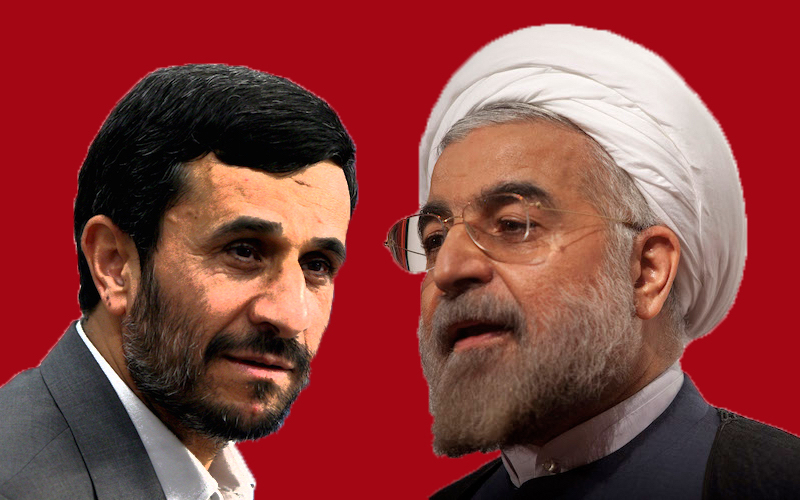
Iranians Voted for Engagement Twice: Now It’s the West’s Turn
The political behavior of the Iranian people is not always easily predictable or discernable. Even though there are hints as to the reasons why they voted for the ultra-conservative Mahmoud Ahmadinejad to become president which embroiled the entire nation in all-out economic and political chaos, the observers of Iran’s political panorama are still debating the dynamics that underpinned Ahmadinejad’s confounding success in 2005 and his disputed reelection in 2009.
However, what is clear is that Iranians didn’t endorse Ahmadinejad because he was a seasoned politician or knew how to bolster the country’s foreign relations. He was a populist leader whose demagogic economic strategies including the distribution of monthly cash among the citizens, lessening the interest rate for bank loans and an affordable housing initiative for low-income families appealed to the majority of the electorate and secured his two terms in office. He used his 8-year opportunity to pursue an outwardly revolutionary foreign policy, which was adventurous and immature, and complicated the nation’s relations with the international community.
But Ahmadinejad witnessed his party-mates and like-minded allies’ humiliating defeat in the 2013 presidential election and 2016 parliamentary elections in which the hardliners lost their dominance in both the executive and legislative branches of the government – something quite untraditional after boasting uncontested supremacy over all the major power centers, especially the unelected offices like the Guardian Council and the judiciary, since the 1979 revolution.
Although Ahmadinejad harbors ambitions of repossessing power and running for president in 2017 while appearing surprisingly unflappable and untouched after facing the harshest criticisms at home and abroad during his tumultuous years in office, the Iranian people have clearly made a choice. They resoundingly said no to radicalism and opted for moderation as the key to their deliverance.
Quite honestly – based on my personal observations – there are thousands of Iranians who are gravely lethargic at times about making critical decisions, and that’s why there are many who never go to polls for the elections. They use excuses like, “the votes have already been counted,” or, “they won’t count my vote, the decision is made somewhere else,” which sounds like a conspiracy theory. In Iran’s political system where democracy is just blooming, voting in the elections is tantamount to benefiting from the smallest opportunities for making things better, practicing participatory decision-making and rendering the future more hopeful. This lethargy and apathy has cost all of us dearly. It was what paved the way for Ahmadinejad to come to power in 2005 without winning a landslide majority. However, in the 2013 presidential contest, my countrymen realized that failing to get up early in the morning, spending a few hours in the voting lines and casting their ballot at the right time would have far worse consequences, and so they took action prudently and elected the best candidate from among the choices made available to them: Hassan Rouhani.
From the early days of assuming office, President Rouhani took steps that indicated he was on the right path. He made the first high-level talks between the governments of Iran and the United States possible after nearly four decades. He responded to a phone call by President Barack Obama in September 2013 when he was about to leave New York after attending the UN General Assembly.
Now, Iran’s Foreign Minister Javad Zarif and the U.S. Secretary of State John Kerry have developed such an amicable personal relationship that they call each other by first names, exchange emails and phone calls on a regular basis, and it’s argued that they’ve spent more time together than any other two foreign ministers.
Electing Hassan Rouhani as president was the first communal decision the Iranian people made for realizing change. They voted for engagement with the world at a time when the vibes of intimidation by the Ahmadinejad loyalists, campaigning for the conservative nominee, Saeed Jalili, were felt across the country.
The legislative elections, which have just been wrapped up after the conclusion of the run-off round in which 68 seats were decided by the voters in 55 constituencies also marked a milestone in the Iranian people’s race towards reform and engagement.
According to the counts provided by the media, the reformists close to President Rouhani won 122 seats while the conservatives could just win 83 seats in a 290-member assembly. 65 seats went to the independents, 11 MPs belong to the People’s Voice Coalition and 6 deputies represent the religious minorities. This is while hundreds of highly-qualified politicians and reformist figureheads – around 5,200 nominees – were barred from running for the parliament by the Guardian Council; otherwise, it’s reasonable to assume that the reformists could have won a sweeping unrivaled majority.
Iranian people have already conveyed the signal that the world anticipated. They want engagement, cooperation and better lives secured by the elimination of hostilities with the outside world. It’s quite evident that the landmark nuclear agreement signed last summer by Iran and the six world powers through an initiative set forth by President Rouhani and Foreign Minister Javad Zarif was the manifestation of Iranian people’s choice and will; a nation worn out by decades of squabbling with the United States and the futile prolongation of the nuclear controversy.
However, unpromising signs are emerging from the White House, Department of Treasury, and Capitol Hill. While Iran, as testified by the International Atomic Energy Agency, has complied with its commitments under the nuclear deal, the U.S. government still appears reluctant and indecisive about lifting the nuclear-related sanctions it had agreed to terminate under the JCPOA. Legitimate transactions between the European banks and Iran’s financial entities are still blocked, hindered or move forward sluggishly because of the U.S. secondary sanctions and the European banks, even after Iran’s reconnection to the SWIFT network, are concerned about handling monetary transactions with Iran. In the past few years, harsh penalties were levied on several European banks for doing trade with Iran.
The BBC reports that throughout the past 10 years, banks have paid $14 billion in fines or out-of-court settlements for working with Iran. France’s BNP Paribas punishment alone amounted to $9 billion. This means the United States is still keeping the cost of legitimate trade with Iran high and therefore, Iran will not benefit from what it was meant to be rewarded by virtue of scaling back its nuclear activities. And just recently, the U.S. Supreme Court ruled that $2 billion in Iran’s frozen assets that were supposed to be unblocked should be turned over to the American families of people killed in the 1983 bombing of a U.S. Marine Corps barracks in Beirut and other attacks attributed to Iran. This is while the veracity of the allegations linking the attacks to Iran has never been substantiated, and the legality of such a decision is seriously under question. Beyond that, this is a ruling that certainly undermines public trust in President Rouhani’s efforts for diffusing tensions with the U.S. and his huge investment on sealing the nuclear deal.
The Iranian people have shown their determination for starting a fresh period of engagement and interaction with the world. They’ve voted for engagement twice, while any different choice could have led to a new round of gloomy confrontations with the West. Now, they expect goodwill and good faith in return. They are enthusiastic about collaboration with the world and excited about the prospects of a possible partnership with the United States; however, they also want to tangibly feel the sanctions relief they have been promised. They’re entitled to that, because their representative government has kept its word, and honored the terms of the nuclear deal honestly. Even by the standards of international law, now it’s the West’s turn to live up to its obligations.

